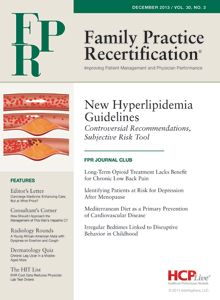Publication
Article
Family Practice Recertification
Irregular Bedtimes Linked to Disruptive Behavior in Childhood
Author(s):
A study sheds some light on how a bedtime routine may play a role in childhood - and possibly adulthood - behavioral problems.
Frank J. Domino, MD
Review
Kelly Y, Kelly J, Sacker A. Changes in bedtime schedules and behavioral difficulties in 7 year old children. Pediatrics. 2013 Nov;132(5):e1184—93. http://pediatrics.aappublications.org/content/early/2013/10/09/peds.2013-1906.
Study Methods
This was a cohort observational review of bedtime data from 10,230 7-year-old participants in the UK Millennium Cohort Study (MCS). Bedtime data at ages 3, 5, and 7 years old was collected and analyzed according to behavioral difficulties scored by mothers and teachers. Children diagnosed with ADHD or autism were excluded from this study.
A difference-in-differences analysis was conducted to determine the effect of an intervention or circumstance at a variety of times, because it reduces the risk of overestimating the benefit of the intervention or circumstance on outcomes.
Confounding factors in the analysis included child’s age and gender, birth order, mother’s age, family income, parental education, maternal stress, disciplinary strategies, mother’s self-rated competence, breastfeeding history, breakfast eaten, academic assistance with reading or math, time spent watching TV and using the computer, rules about watching TV, TV located in bedroom, parental employment, parental feelings of adequate time with child, if the child was read to, child care usage, overcrowding, bedwetting, and if sleep was bothered by wheezing.
Patient Demographics
The MCS is a nationally representative longitudinal study of infants born in the United Kingdom. The sample was drawn from births between September 2000 and January 2002. The survey involved home visits by interviewers when cohort members were aged at 9 months and 3, 5, and 7 years. During structured interviews, questions were asked about socioeconomic circumstances, demographic characteristics, home learning, psychosocial environment, and family routines, including bedtimes.
Results and Outcomes
Children with non-regular bedtimes had more behavioral difficulties. There was an incremental worsening in behavioral scores through early childhood as irregular bedtime frequency increased, according to ratings by both mothers and teachers. Over the course of the study, there was a 12% attrition of participants, though the study was adjusted to reduce risk of overestimation of benefit from this loss. Among children who changed from regular to non-regular bedtimes, analysis found a statistically significant worsening in behavioral scores between the ages of 5 and 7.
Conclusion
Regular bedtimes during early childhood have an important influence on children’s behavior.
Commentary
Two clear challenges for parents involve bedtime routines and coping with behavioral problems at all stages of life. This study sheds some light on how a bedtime routine may play a role in childhood — and possibly adulthood — behavioral problems.
The data suggests children aged between 3-7 years old with irregular bedtimes have greater behavioral issues than those with regular times. As bedtime irregularity persisted through early childhood, the risk for dysfunction increased.
The good news is this may be reversible, as strong data from the study suggests improvements in parental and teacher perceived behavioral scores as bedtime moved from irregular to regular. Although it is less statistically compelling, the data also demonstrates that an opposite change from regular to irregular bedtimes correlates with an increased risk for behavioral problems.
Possible mechanisms of action for these findings include the effect of disrupted circadian rhythm on behavior, as well as the influence of sleep on brain development and maturation.
As an observational study, there is risk of inherent bias. Bedtime routines were collated retrospectively by parents and are thus open to recall bias and subjectivity. In addition, teachers’ observations of “behavioral problems” are potentially biased upon the many factors that influence a positive or negative teacher-learner experience.
Is this a call for clinicians to evaluate the bedtime routines of all children? Not yet. However, there are clear opportunities for interventions aimed at supporting family routines that may have an important impact on health throughout life. There is likely some benefit in identifying the bedtime routines of children at high risk, as well as cases where a parent or teacher has identified a behavioral problem. Offering guidance to parents on maintaining a regular bedtime and providing emotional support to those who are coping with these challenges may have a lifetime of benefit.
About the Author
Frank J. Domino, MD, is Professor and Pre-Doctoral Education Director for the Department of Family Medicine and Community Health at the University of Massachusetts Medical School in Worcester, MA. Domino is Editor-in-Chief of the 5-Minute Clinical Consult series (Lippincott Williams & Wilkins). Additionally, he is Co-Author and Editor of the Epocrates LAB database, and author and editor to the MedPearls smartphone app. He presents nationally for the American Academy of Family Medicine and serves as the Family Physician Representative to the Harvard Medical School’s Continuing Education Committee.






